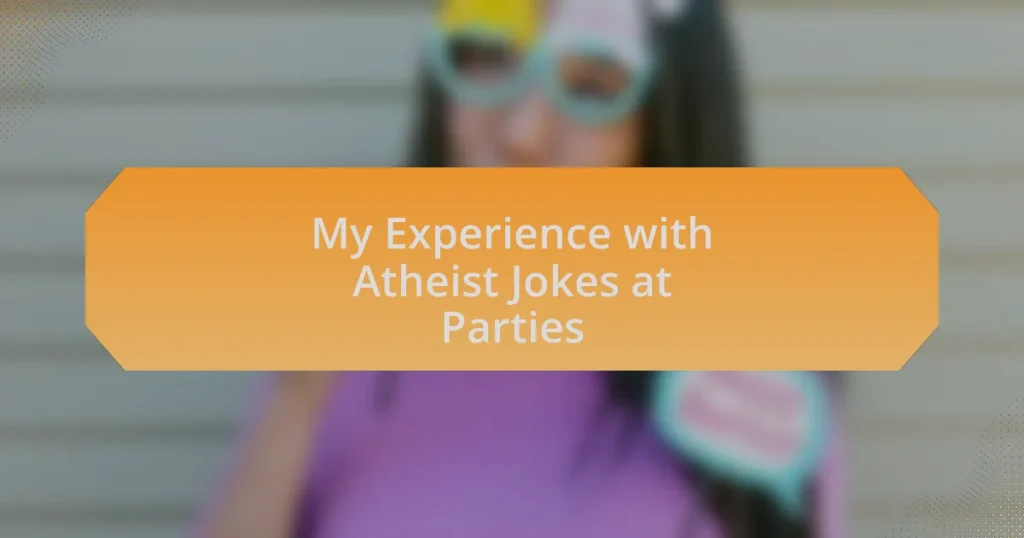Key takeaways:
- Atheist cartoons blend humor and critical commentary, making discussions about belief more engaging and accessible.
- Humor in atheism fosters camaraderie among non-believers, allowing for light-hearted reflection on serious topics like morality and spirituality.
- Common themes in atheist jokes include the contrast between secular and religious lifestyles, highlighting absurdities in religious doctrines and existential questions.
- Reactions to atheist humor vary, with some appreciating it as a way to open dialogue while others may feel uncomfortable, revealing underlying beliefs.
Author: Julian Hartwell
Bio: Julian Hartwell is an acclaimed author known for his thought-provoking novels that explore the intricacies of human relationships and societal dynamics. With a background in psychology and sociology, Julian weaves rich narratives that delve into the complexities of the human experience. His work has garnered numerous awards and has been featured in prominent literary journals. When not writing, he enjoys hiking in the mountains and volunteering at local community centers. Julian resides in Seattle with his partner and two spirited dogs.
Introduction to atheist cartoons
Atheist cartoons serve as a unique medium that combines humor with thought-provoking commentary on belief and skepticism. I remember my first encounter with an atheist cartoon—it was a simple, yet clever illustration that made me chuckle while simultaneously challenging my perspective on religion. How often do we find humor that invites us to think critically about deep and often sensitive topics?
These cartoons not only entertain but also foster discussion among those who identify as atheists or are simply curious about different belief systems. They can break the ice at social gatherings, transforming potentially awkward moments into opportunities for dialogue. I can’t count the times when I’ve shared a funny comic at a party and seen it spark an engaging conversation about faith and doubt.
Moreover, the beauty of atheist cartoons lies in their ability to distill complex ideas into relatable visuals and punchlines. Have you ever found yourself laughing at a cartoon that captures a sentiment you’ve felt but couldn’t articulate? That’s the power of humor in challenging societal norms and encouraging open-mindedness. Each cartoon can resonate on a personal level, making atheism accessible and relatable to a wider audience.
Understanding the humor in atheism
When discussing the humor in atheism, it often stems from a shared experience among non-believers. I recall a night at a gathering when someone shared a joke about an atheist’s relationship with Sunday mornings. The punchline highlighted the irony of waking up rested instead of rushed to morning service, and it resonated with all of us. This type of humor brings a sense of camaraderie; it’s relatable and reflects a lifestyle choice many embrace.
Atheist jokes can sometimes revolve around common misconceptions or stereotypes about atheists. I’ve chuckled at quips that cleverly underline how some people assume atheists lack morality. This satirical edge reveals the absurdity of such beliefs, encouraging a light-hearted examination of profound issues. Isn’t it fascinating how laughter can dismantle preconceived notions?
Moreover, humor in atheism often acts as a bridge to conversations about belief and skepticism, without the heaviness of debate. I once included a witty cartoon in a group chat, which led to a lively discussion about spirituality and science. This shows that humor doesn’t just entertain; it invites dialogue and reflection, making it a vital tool for exploring depth in both personal and communal belief systems.
Common themes in atheist jokes
Atheist jokes frequently touch on the contrast between religious practices and secular lifestyles, often employing irony to highlight this divide. I remember laughing at a friend’s quip about how an atheist at a wedding feels like they’re just there for the free food. It struck me as profoundly relatable, reflecting that unique perspective many non-believers share when navigating predominantly religious gatherings.
Another common theme revolves around the supposed contradictions in religious doctrines, poking fun at their absurdities. I once heard a joke about a believer praying for a parking spot, only to find one right away, contrasted with an atheist’s nonchalant approach: “I just believe in good luck!” This kind of humor emphasizes our different outlooks on life, raising a question I’ve pondered: can laughter be a unifying force, even when it challenges core beliefs?
Lastly, many atheist jokes target the fear of the unknown, particularly regarding death and the afterlife. I’ve found comfort in humor that satirizes these fears, such as a joke about how atheists plan their funerals—focusing on final wishes rather than heavenly rewards. It’s a refreshing take, evoking both laughter and introspection on how we each approach such weighty existential questions.
Reactions from friends and family
The reactions I’ve received from friends and family when I share atheist jokes can be quite a mixed bag. Some chuckle and appreciate the humor, viewing it as an opportunity to discuss deeper philosophical issues. Others, though, look a bit uncomfortable, as if my jokes have suddenly turned the gathering into a debate stage. I find it interesting how humor can so easily expose our underlying beliefs.
In one instance, my uncle, a staunch believer, shook his head while grinning at one of my quips. He once told me that while he doesn’t personally relate to the punchline, he admires my ability to navigate contentious topics with a lighthearted approach. This led to a memorable and very open discussion about faith and doubt that neither of us expected. It was refreshing to turn what could have been an awkward moment into a meaningful conversation.
Then there are those moments when a joke falls flat, and you can almost feel the tension in the room. Once, I made a lighthearted comment about prayer being “just meditation with a twist,” and I could practically hear crickets chirping. My sister, who was present, awkwardly giggled, trying to diffuse the situation. It made me wonder: is there a fine line between humor and vulnerability, especially when it comes to something as personal as belief?



